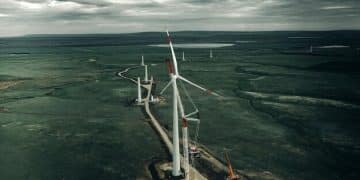UK net zero transition delays: what you need to know

Anúncios
The UK net zero transition aims to achieve zero greenhouse gas emissions by 2050 through technological innovations, public engagement, government strategies, and international cooperation for a sustainable future.
When we talk about the UK net zero transition delays, it’s essential to understand their implications on our climate initiatives. Have you wondered how these setbacks affect policy and our future? Let’s dive into the details.
Anúncios
Overview of the UK net zero transition
The UK net zero transition is a crucial step toward achieving climate goals. It aims to reduce greenhouse gas emissions and promote sustainability across the nation. Understanding this transition involves looking at its main components.
Key Objectives
One of the primary objectives of the net zero transition is to create a greener economy. This involves innovating in renewable energy sources and promoting energy efficiency. The UK government is committed to achieving net zero emissions by 2050.
Anúncios
- Transition to renewable energy
- Increasing energy efficiency
- Cuts in greenhouse gas emissions
Another important aspect is the role of policy and public engagement. Citizens must be involved in this transition to ensure a sustainable future. The government encourages community initiatives and public awareness campaigns to foster this involvement.
Challenges Ahead
While the objectives are clear, challenges persist. Economic factors, technological limitations, and public acceptance are crucial elements that may impede progress. It’s vital that stakeholders come together to tackle these challenges effectively.
- Economic fluctuations impacting funding
- Technological advancements lagging
- Public perception of renewable energy
In summary, the UK net zero transition is a multidimensional effort aimed at creating a sustainable future. It requires cooperation between the government, industry, and the public to overcome the barriers we face.
Key factors contributing to delays

Several key factors contributing to delays in the UK net zero transition are shaping its progress. Understanding these factors is vital for navigating the path toward sustainability.
Political Landscape
The political environment plays a significant role in influencing the pace of the transition. Changes in government priorities can shift focus away from climate goals. Additionally, inconsistent policies can create uncertainty for businesses and investors, which may slow down advancements.
- Changes in government leadership
- Shifting political priorities
- Inconsistent regulations and guidelines
Public opinion also significantly affects the transition. Awareness and support from citizens can drive government action. Conversely, public resistance or lack of awareness can hinder necessary changes.
Economic Constraints
Economic factors also contribute to delays in reaching net zero. Fluctuations in economic stability can affect investment in renewable energy projects. Challenges such as budget cuts and financial uncertainty can limit resources available for innovative solutions.
- Economic downturns affecting funding
- High costs of renewable technologies
- Market volatility impacting investment decisions
Lastly, technological limitations can impede progress. While there are many advancements, some technologies may not be ready for widespread implementation. This can slow the adoption of cleaner energy solutions.
Addressing these challenges requires collaboration between government, industry, and the public. By understanding these key factors, stakeholders can work together more effectively to push forward the UK net zero transition.
Impact on the environment and economy
The impact on the environment and economy due to the UK net zero transition is profound. As the nation shifts towards sustainability, both positive and negative effects will emerge.
Environmental Benefits
Transitioning to a net zero economy presents numerous environmental advantages. Reducing greenhouse gas emissions can significantly improve air quality and mitigate climate change effects. Cleaner air leads to better public health, decreasing respiratory diseases and enhancing overall well-being.
- Decreased greenhouse gas emissions
- Improved air and water quality
- Preservation of biodiversity
Moreover, the increase in green spaces and renewable energy projects contributes to the preservation of ecosystems. Properly managed energy resources can support wildlife and restore natural habitats.
Economic Opportunities
From an economic standpoint, the move towards net zero opens new job opportunities. The renewable energy sector is likely to grow, creating thousands of jobs in installation, maintenance, and innovation.
- Growth in green technology industries
- Job creation in renewable energy sectors
- Investment opportunities in sustainable projects
This transition encourages innovation and entrepreneurship. Businesses focusing on sustainable practices can thrive, while traditional fossil fuel industries may face challenges. The adaptation to green technologies is essential for long-term economic resilience.
However, it’s important to address the potential downsides. Short-term job losses might occur in traditional sectors as they adapt to changing markets. Thus, balancing economic growth and environmental protection is critical during this transition.
Overall, the shift towards a net zero economy will reshape the UK’s relationship with its environment and economy, leading to a more sustainable future.
Government strategies to address the delays

The government strategies to address the delays in the UK net zero transition involve various approaches aimed at enhancing progress and meeting climate targets. Understanding these strategies is crucial for stakeholders as they navigate the complexities of implementing change.
Policy Development
One key strategy is the development of clear and consistent policies. The government aims to create a framework that encourages sustainable practices while providing direction for businesses. These policies can help businesses align with climate goals and secure investment.
- Establishing long-term carbon reduction targets
- Creating incentives for renewable energy initiatives
- Regularly updating regulations to ensure alignment with climate science
Moreover, effective communication is essential. The government must engage with stakeholders, including businesses and the public, to foster a shared understanding of goals. Transparency in policy-making can build trust and encourage collaboration.
Investment in Innovation
Another strategy involves investing in research and development of new technologies. By funding innovative methods for renewable energy production and energy efficiency, the government can accelerate the transition. This investment will help overcome technological barriers and create job opportunities in emerging industries.
- Funding initiatives for green tech startups
- Supporting research on sustainable practices
- Encouraging partnerships between public and private sectors
Additionally, the government is focusing on enhancing infrastructure to support the transition. Expanding electric vehicle charging networks and improving public transport can facilitate the move away from fossil fuels. Infrastructure investments are crucial in building a sustainable economy.
In conclusion, addressing delays in the UK net zero transition requires a multifaceted approach. With strong policies, significant investments, and effective communication, the government can lead the country toward a sustainable future and meet its climate commitments.
Future prospects for achieving net zero goals
The future prospects for achieving net zero goals look promising, yet they come with a set of challenges. Many experts believe that the UK can reach its net zero targets with the right strategies in place.
Technological Innovations
One major factor influencing the future of the net zero transition is ongoing technological advancements. Innovations in renewable energy, such as solar, wind, and energy storage, are critical. As these technologies become more efficient and affordable, their adoption will increase significantly.
- Improved battery storage for renewable energy
- Advancements in carbon capture technology
- Emergence of new sustainable energy materials
These innovations may lead to a reduction in greenhouse gas emissions, helping achieve climate goals more effectively.
Public Engagement
Another vital aspect of achieving net zero is public engagement. Educating citizens about sustainability and involving them in community initiatives can drive change. When individuals commit to reducing their carbon footprints, the cumulative impact can be substantial.
- Community-led sustainability projects
- Educational campaigns on energy conservation
- Encouraging public transport usage
This grassroots support can help keep pressure on the government and businesses to maintain their commitments to net zero.
Moreover, international cooperation will play an important role in reaching these targets. Climate change is a global issue, and collaboration with other countries can lead to shared technologies, resources, and knowledge. Improved climate policies and trade agreements can enhance efforts toward sustainability.
Lastly, potential economic shifts may create new opportunities within green industries. As the push for sustainability increases, job markets may evolve to meet the demand for green technology and renewable energy sources.
In summary, while challenges remain, the future prospects for achieving net zero goals in the UK show optimism through innovation, public involvement, and international cooperation.
FAQ – Frequently Asked Questions about the UK Net Zero Transition
What are the main goals of the UK’s net zero transition?
The primary goals include reducing greenhouse gas emissions to zero by 2050, promoting sustainability, and enhancing overall air quality.
How will technological innovations impact the net zero goals?
Technological advancements in renewable energy and efficiency will play a crucial role in achieving net zero by making sustainable options more accessible and effective.
Why is public engagement important in the net zero transition?
Public involvement helps increase awareness, encourages sustainable practices, and builds community support for government initiatives.
What role does international cooperation play in achieving net zero?
International cooperation allows for shared resources, technology transfer, and collaborative efforts, enhancing the effectiveness of climate initiatives globally.





